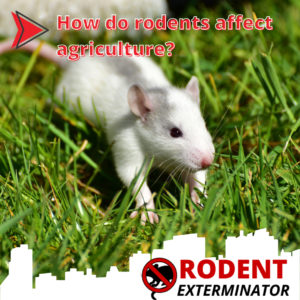Rodents are a natural part of the environment, but their infestation can be problematic for human beings.
It’s difficult to tell when rodents are present in an agricultural setting because they live underground during the day and come out at night to chew on crops.
Rodent infestations in agriculture can cause a huge amount of damage to crops and affect the environment as well.
These animals reproduce quickly and spread disease, which can be problematic for human beings. In order to address this issue, it’s important to understand how rodents behave and the damage they can cause.
For example, rodents wreak havoc on structures as well. Rat teeth never stop growing, thus they must be chewed to keep them from becoming too long.
Wood, plastics, and concrete utilized in urban agricultural operations may be damaged as a result of the chewing.
Finally, rodents result in financial losses owing to crop damage and facility damage.
This article will explore the various ways rodent infestations can occur in an agricultural setting and offer some solutions. Keep reading!
How do rats affect farms?
 Rats and mice have always been a concern on farms where there is plenty of food and nesting locations.
Rats and mice have always been a concern on farms where there is plenty of food and nesting locations.
They carry 45 diseases and can contaminate farm feed and water supplies, allowing disease to spread from contaminated to uncontaminated areas and from animal to animal.
They can cause a lot of damage to crops, and can also contaminate food with their droppings and urine.
They can also transmit diseases to humans and livestock, which can be costly and dangerous.
How do rats and mice destroy crops?
Rodents can eat and damage crops in a number of ways:
- Gnawing through the rind of the lower internodes of canes and damage to the roots during the building of burrows by rats .
- Eat the seeds and fruit.
- They can also contaminate the food with their droppings and urine, which can spread diseases.
- A rat population can grow very quickly, so it’s more difficult to get rid of them.
- They create holes in the ground.
Garden mice are particularly fond of seeds, therefore newly planted garden seeds such as corn and sunflower seeds are popular targets.
Mice are also attracted to newly sprouted grass seed, cereals, and lush green vegetables.
How do pests affect agricultural production?
Pests can have a significant negative effect on agricultural production. To mention some of them:
- In the field and in stores, they eat and harm human foods.
- They spoil it in stores by contaminating it with urine and droppings, lowering the retail value.
- They ruin various objects (packaging, clothes, and furniture) and constructions as a result of their gnawing and burrowing habits (floors, buildings, bridges, etc.).
- They can start fires by nibbling on electrical lines.
- They are responsible for the transmission of diseases that are harmful to humans.
- They contaminate crops by leaving their urine, saliva, and droppings around.
- Pests consume the leaves of crops, limiting the plant’s photosynthetic activity.
- Farmers often have to use pesticides and other forms of pest control, which can be expensive and environmentally harmful.
What attracts rats and mice on a farm?
There are a number of things that can attract rats and other rodents to a farm:
- Food and water sources around the farm and crops.
- Shelter that the farm provides, such as buildings, sheds, or stacks of hay.
- A lot of waste or garbage.
What crops attract rats and mice?
Rodents will visit the crops or farm to feed if there is no maize, grain, or seed to eat. They will look for:
- Cabbage
- Cauliflower
- Leaks
- Peas
- Turnips
- Potatoes
- Zucchini
What indicates that there are rodents on your farm or crop?
There are some signs that every farmer should be aware of:
- At the time of plant establishment, there are bare areas and eaten plants with mouse holes.
- In the spring, white heads are scattered or in patches with mouse holes nearby.
- Mice chewing seed and leaves resulted in poor germination and chewed young plants.
- Stems gnawed just above the node and died as a result.
- In the head, a seed was chewed.
- On one side, pods were lopped and bitten, and the seed was consumed.
- Rodent footprints in the form of narrow, worn traces through dust and soil.
What to do if there are rodents on your farm?
There are a number of ways to resolve rodents problem on your farm:
- When damage occurs, use in-crop baiting.
- Reduce grain spillage and harvester grain loss in paddocks.
- Heavy grazing can aid in the recovery of large harvest grain losses.
- Clean up any grain spills near field bins, augers, and other grain storage areas.
- Cover should be removed or reduced.
- Hire professionals in rodent control and extermination.
Rodent infestation in agriculture is a serious problem. These animals reproduce quickly and spread disease, which can be problematic for human beings.
In order to address this issue, it’s important to understand how rodents behave and the damage they can cause. This article will explore the various ways rodent infestations can occur in an agricultural setting and offer some solutions.
The best choice a farmer can make is to act immediately to prevent further crop losses and to be careful when coming in contact with these animals and their waste.
Contacting professionals in this area can make the extermination process as quick and safe as possible for you.
